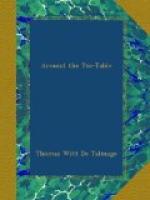What every minister needs is a fresh message that day from the Lord. We would sell cheap all our parchments of licensure to preach. God gives his ministers a license every Sabbath and a new message. He sends none of us out so mentally poor that we have nothing to furnish but a cold hash of other people’s sermons. Our haystack is large enough for all the sheep that come round it, and there is no need of our taking a single forkful from any other barrack. By all means use all the books you can get at, but devour them, chew them fine and digest them, till they become a part of the blood and bone of your own nature. There is no harm in delivering an oration or sermon belonging to some one else provided you so announce it. Quotation marks are cheap, and let us not be afraid to use them. Do you know why “quotation” marks are made up of four commas, two at the head of the paragraph adopted and two at the close of it? Those four commas mean that you should stop four times before you steal anything.
If there were no question of morals involved, plagiarism is nevertheless most perilous. There are a great many constables out for the arrest of such defrauders. That stolen paragraph that you think will never be recognized has been committed to memory by that old lady with green goggles in the front pew. That very same brilliant passage you have just pronounced was delivered by the clergyman who preached in that pulpit the Sabbath before: two thieves met in one hen-roost. All we know of Doctor Hayward of Queen Elizabeth’s time is that he purloined from Tacitus. Be dishonest once in this respect, and when you do really say something original and good the world will cry out, “Yes, very fine! I always did like Joseph Addison!”
Sermons are successful not according to the head involved in them, but according to the heart implied, and no one can feel aright while preaching a literary dishonesty. Let us be content to wear our own coat, though the nap on it is not quite as well looking, to ride on our own horse, though he do not gallop as gracefully and will “break up” when others are passing. There is a work for us all to do, and God gives us just the best tools to do it. What folly to be hankering after our neighbor’s chalk line and gimlet!
CHAPTER XXXIII.
Literary abstinence.
It is as much an art not to read as to read. With what pains, and thumps, and whacks at school we first learned the way to put words together!
We did not mind so much being whipped by the schoolmaster for not knowing how to read our lesson, but to have to go out ourselves and cut the hickory switch with which the chastisement was to be inflicted seemed to us then, as it does now, a great injustice.
Notwithstanding all our hard work in learning to read we find it quite as hard now to learn how not to read. There are innumerable books and newspapers from which one had better abstain.




